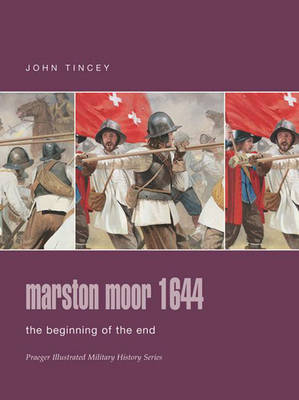Osprey Campaign S.
2 primary works
Book 82
This, the first ever Osprey campaign title to deal with the English Civil War, looks at the battle of Edgehill, the first major clash of the Wars. In 1642 both Royalists and Parliamentarians expected that one great contest of arms would see the crushing of their enemies. In the morning after their field armies blundered into contact on 22 October 1642, the tide of battle swept Prince Rupert's cavalry to triumph, but saw victory snatched away as the Royalist infantry was hurled back by the defiant Parliamentarians. The chance for decisive victory was lost and the bloody civil war raged on.
The battle of Edgehill was the first major clash of the English Civil Wars. In 1642 both Royalists and Parliamentarians expected that one great contest of arms would see the crushing of their enemies. When their field armies blundered into contact on the evening of 22 October 1642, Prince Rupert urged King Charles to array his army on the great ridge of Edgehill and give battle. The next day, amidst abject cowardice and absolute courage, the tide of battle swept Rupert's cavalry to triumph, but saw victory snatched away as the Royalist infantry was hurled back by the defiant Parliamentarians. The chance for decisive victory was lost and the bloody civil war raged on. This first-ever English Civil War campaign title from Osprey uncovers remarkable new evidence to transform the accepted view of this key battle.
Book 119
The entry of the Scots into the English Civil War on 19 January 1644 on the side of Parliament radically changed the balance of power in the North of England. The Royalists in the North were forced onto the defensive and besieged in York. In a bold march Prince Rupert outmanoeuvred his enemies and relieved York without a shot being fired. However, when Rupert met the allied army in battle on Marston Moor on 2 July his cavalry was defeated by Cromwell's Ironsides who then turned on the Royalist infantry. The result was a hard-fought but catastrophic defeat; the Royalist army was crushed and their forces driven from the north of England.
The entry into the English Civil War of the Scots on the side of Parliament radically changed the balance of power in the North of England. The Royalists were forced onto the defensive and the Marquis of Newcastle found his army besieged in York. Prince Rupert proposed a bold plan to relieve York. With cavalry from the King's army he would seize lightly defended Lancashire, a county sympathetic to the Royalist cause, raise a new force, relieve York and unite with the Marquis of Newcastle. He executed his plan with spectacular success and, as the Parliamentarian and Scots armies marched out to meet him outside York, he skilfully marched around their flank and entered York unopposed. Rupert could now have re-supplied the garrison and marched south to rejoin the King. Unfortunately, having received what appeared to be a direct Royal command to fight at any odds, Rupert decided to march out to attack his enemies. Delayed in attacking by Newcastle's slowness, Rupert was forced to watch on 2 July as his enemies formed up on the ridge in front of him. Rupert decided to await the new day before mounting his attack, but it became clear that the Allied armies were advancing. After a desperately hard-fought battle the Royalist army broke. The Parliamentarian and Scots armies wasted their hard won victory and allowed the king to keep the war going, but the loss of the North had decisively tilted the balance of military power in favour of Parliament.

